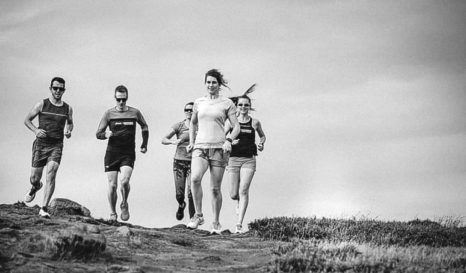How much exercise do you really need?
The average person in the US takes fewer than 5,000 steps a day, and in the UK it isn’t much more. Anthropologist Herman Pontzer looks at how much we need for optimum health
 Our great ape relatives are very sedentary, resting and sleeping for 18 hours a day, saving their calories for survival and reproduction. But homo sapiens evolved to be hunter gatherers – the more active we were, the more able to find food and reproduce. Our brains evolved to reward hard work – enabling the release of feel-good endorphins and endocannabinoid hormones in response to exercise.
Our great ape relatives are very sedentary, resting and sleeping for 18 hours a day, saving their calories for survival and reproduction. But homo sapiens evolved to be hunter gatherers – the more active we were, the more able to find food and reproduce. Our brains evolved to reward hard work – enabling the release of feel-good endorphins and endocannabinoid hormones in response to exercise.
So, we are always faced with two competing internal demands: the need to rest, from our ape ancestors; and the need to exercise, from our more evolved hunter-gatherer brains.

Exercise has been proven to benefit our bodies and our minds: it strengthens our hearts and muscles, increases our life span, reduces chronic inflammation, moderates hormone production and blunts our physiological response to stress. Aerobic exercise also increases blood flow to the head – stimulating regeneration of brain cells and keeping old ones healthy. Challenging our balance, navigation and movement also helps to maintain our cognitive reserve, which is likely to ward off degenerative brain conditions like dementia.
Herman Pontzer’s study on Hadza hunter gatherers in Tanzania and US and European subjects shows that we don’t actually expend more calories when we are more active. Our bodies just adapt to use fewer calories in other parts of our lives.
Pontzer says that a sedentary lifestyle gives you too many spare calories, meaning normally short-lived physiological activities like fight or flight, inflammation and even sex hormones are always on. Overtraining can throw the balance out, too – with results such as infertility, lower immunity to infection, low libido.
Pontzer suggests that the Hadza tribe are a good benchmark. They do about two hours of moderate and vigorous activity every day: hard walking over rocky terrain, digging for root vegetables, climbing and chopping trees, dragging firewood and carrying water.
This equates to about 15,000 steps a day – or two hours of brisk walking; and probably more to counteract an entire day spent sitting at a desk. If this seems unattainable to many people, there is hope, though: even small amounts of daily exercise have been proven to be beneficial to body and mind.
